
In today’s world, so many devices need to be powered, both in our homes and businesses. Phones, computers, televisions, appliances, and even cars must be powered up every day. The expense can add up over time when you consider the cost of electricity or gas needed to run those devices.
When it comes to storing energy in your home, there are two main types of products on the market—batteries and solar panels. Batteries store energy you already have. Solar panels produce energy from the sun, which in turn can be stored in batteries or used directly.
It is not easy to come by an energy storage solution that offers everything you could want—flexibility, control, compatibility with solar, and the ability to scale up or down over time. Duracell Power Center Battery claims to provide all these.
In this product review, we’ll go over what makes this battery and solar storage solution so unique and why it might be right for you.
How Duracell Power Center Battery Powers Homes
This lithium iron phosphate (LFP) battery has three main functions when it comes to home power management:
- Backup power to ensure your system stays online during a power outage.
- Maximizing self-consumption and thus minimizing the need for buying electricity from utilities.
- Sell surplus solar back to utility companies through net metering programs.
Because it serves all these purposes, we think of it as the most flexible home battery available.

Product Overview of Duracell Power Center Battery
Duracell’s modular solution to power backup is an industry-first, offering Lithium Iron Phosphate (LiFePO4) batteries compatible with both new and existing solar storage systems.
The solution includes:
- A battery
- An AC Control Module that acts as a load controller for either two or four batteries
- DC-to-AC inverter to power household devices
- 24/7 real-time monitoring of your system via a Smartphone App
Features
Non-Lead Base
Duracell released their own take on a new type of battery called lithium iron phosphate (LiFePO4 or LFP) — a completely different type of battery technology than what you see in everyday power tools.
Lithium batteries are super energy dense, which makes them ideal for long-term energy storage applications like solar storage and electric vehicle power systems. They also charge and discharge more efficiently than traditional lead-acid batteries. The latter can only be fully charged or discharged once per day, which is a disadvantage for grid-scale integrated energy storage systems that need daily cycling.
Flexible Modular System
If you want to run your home off solar power alone, you can install one 10kWh unit. One 20kWh unit will fulfill the purpose of backup protection against power outages. Should you require more capacity further down the road, you simply add another module.
Full Control of Energy Supply
Using solar storage with backup batteries means you don’t have to rely on traditional utility companies for your electricity needs.
Duracell Power Center Battery allows you to monitor the electricity levels each appliance consumes with an app like the iSmartAlarm. You can then adjust the battery’s settings and your household’s usage habits accordingly to reduce overall consumption and save money on your utility bills.
The built-in software also automatically updates with the latest functional technology and compliance features according to government regulations.
Load Shifting
Solar energy is stored in the battery and can be set to run in tandem with time-of-use rate plans. This facilitates the efficient use of power by maximizing solar and minimizing electric sources.
Preprogrammed Backup Power
You cannot anticipate outages, but Duracell Power Center Battery equips you with an uninterrupted power supply when an outage happens. Compared to other batteries, it does not require to be turned on manually. Rather, it activates the moment your main electric source fails.
Economical and Eco-Friendly
This battery can be charged with either an electrical grid connection or a solar PV system. Unlike most competitors, it allows users to use existing electrical equipment rather than purchase expensive appliances.
And because it is made with less toxic materials, a LiFePO4 battery is also safer to use.
Warranty and Guarantee
Duracell backs their Power Center Battery with a 10-year warranty, which gives you peace of mind since you know the company stands behind their product. In addition, they offer a 30-day performance guarantee. If you are unhappy with your purchase, they will accept a return and send you a full refund.
Summary of Duracell Power Center Battery Features
- ✅ Continuous power / peak output (kW)
- - 5kW: 5 / 8.5
- - 10kW: 10 / 17
- ✅ Base Unit Storage Capacity (kWh)
- - 5kW: 14-42 kWh
- - 10kW: 28-56 kWh
- ✅ Use with any PV design
- ✅ Retrofit to any existing PV system
- ✅ Backup power (no PV)
- ✅ Auto recovery
- ✅ Water-free cooling
- ✅ Outdoor installation
- ✅ Battery Chemistry: Lithium Iron Phosphate (LFP)
- ✅ Flexible storage capacity
- ✅ Charges from solar in backup mode
- ✅ Built-in VPP capability
- ✅ Solar self-consumption/backup
The Verdict
Duracell Power Center Battery and solar energy storage system is the only battery solution available today that provides homeowners with an efficient solution in case of power outages. It also enables them to take control of their energy needs while cutting costs simultaneously.
The company also provides 24/7 customer support, considered essential for consumers of basic utility services.
With all the bases covered, it is not surprising that the Duracell brand enjoys a higher consumer trust rating than its competitors, including Tesla, LG Chem, and Solax. Therefore, it is easy to recommend their latest offering as one of the best home battery solutions currently available on the market today.

Authored by Ryan Douglas
NRG Clean Power's resident writer and solar enthusiast, Ryan Douglas covers all things related to the clean energy industry.


